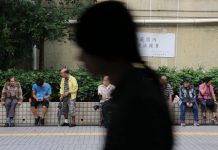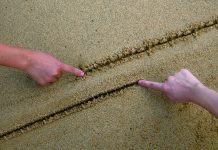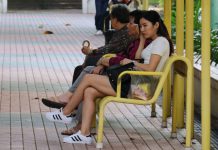San Shek Wan Village in South Lantau is an example of a village where a non indigenous villager is the resident representative. In most indigenous villages, both representatives are indigenous inhabitants. Former legislator Albert Chan Wai-yip, has lived in the village for 19 years.
Chan says that despite the dual representative system, rural elections are essentially unfair to non-indigenous villagers. He says indigenous village representatives have more power than resident representatives because they are authorised to deal with matters relating to the traditional rights and interests of indigenous inhabitiants,According to Chan, whenever the government holds consulations on issues concerning the interests of indigenous people and Ding rights, “Any opposition from the resident representative will go down the drain.”
Chan has strained relations with the indigenous inhabitant representative in San Shek Wan Village.“I don’t really have any interaction with the family of the indigenous inhabitant representative,” says Chan, “We are sworn enemies.”
Chan says that 14 years ago, he tried to construct a water pipe running from a hillside water source to a car park for public use, but the indigenous representative. Mo Ngan-fuk damaged it with a hatchet. Chan says Mo told him he had no right to construct anything in the village unless he paid him HK$5000. “Basically, you need to pay the indigenous inhabitant representative whatever you do in the village.”
Eventually, the argument was settled with police mediation and Chan has had no interactions with Mo since then.
Despite his feud with Mo, Chan says the relationship between indigenous and non-indigenous inhabitants in other villages can be harmonious. He thinks it depends on the individuals concerned.

“It’s a matter of personality and attitude, I don’t think every indigenous inhabitant representative regards non-indigenous villagers as enemies.” says Chan.
Problems arise when indigenous representatives put personal benefits before the needs of villagers and abuse their power in handling affairs relating to the lawful traditional rights and interests of indigenous inhabitants. Besides, what constitutes their ‘lawful traditional rights and interests” is not without controversy. Ding rights have been criticised in recent years, and traditional customs meant that until 1994 indigenous women had no legal right to inherit property. The law that gave women the right to inherit was bitterly fought by the Heung Yee Kuk and other rural organisations.
However, Hau Fuk-tak, Kam Tsin’s indigenous representative of 22 years and 1st Vice-chairman of the Sheung Shui District Rural Committee and District Councillor for North District, holds a different view. He thinks there is nothing unfair about the situation where both the indigenous representative and resident representative is an indigenous villager.
“This just implies that the non-indigenous villagers would like to give the power back to indigenous inhabitants.” says Hau. Hau has been elected unopposed since 1998.
As the village representative and 1st Vice-chairman of the Sheung Shui District Rural Committee, Hau handles complaints from all villagers. He says most complaints in Kam Tsin are related to septic discharge or parking space, rather than disagreements between indigenous and non-indigenous villagers. Hau thinks non-indigenous villagers get along well with indigenous inhabitants in Kam Tsin.









































